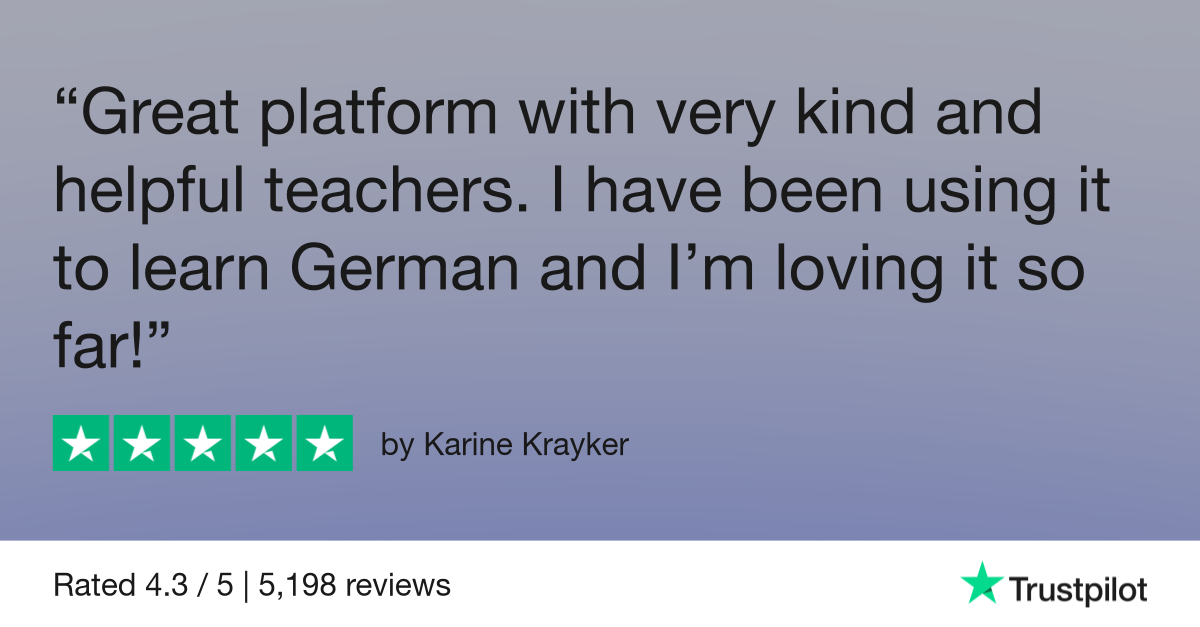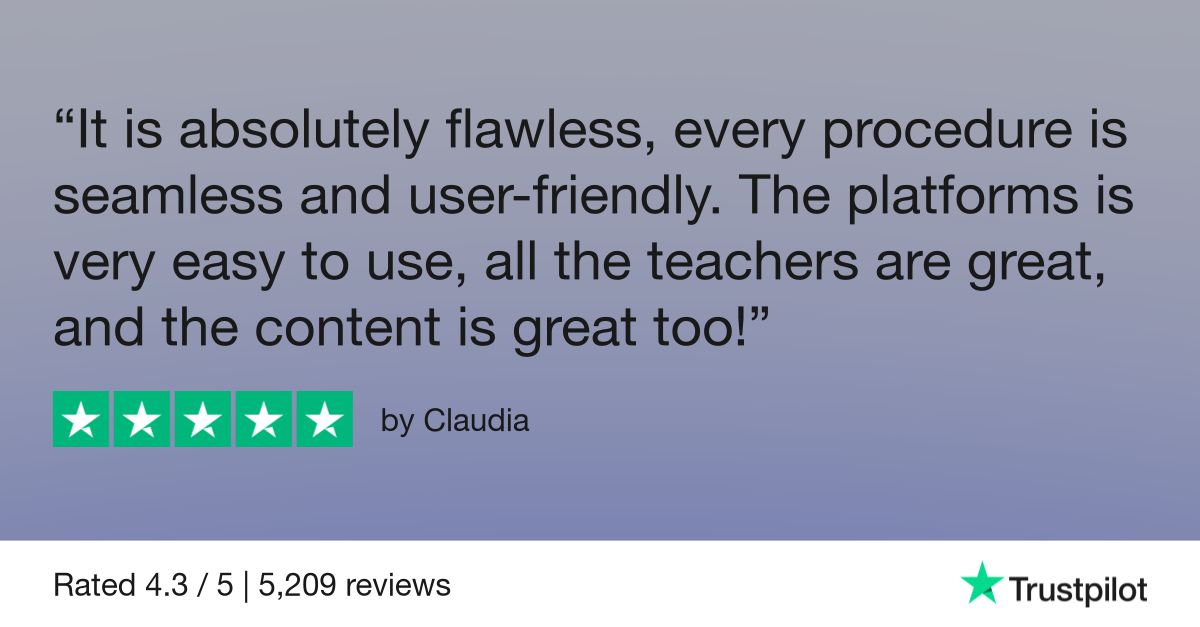A guide to auxiliary verbs in German: How to use “sein,” “haben”, and “werden”

They are essential for expressing past and future actions, as well as for using the passive voice. These versatile verbs are everywhere, and mastering them opens the door to talking about past experiences, describing ongoing actions and making future plans.
In this article, you’ll get to know the three key German auxiliary verbs: sein, haben and werden. You’ll learn how to conjugate them in different tenses while using the correct word order, and you’ll even find some helpful tips for practicing these important verbs.
- The 3 essential German auxiliary verbs
- Conjugating German auxiliary verbs
- Word order with auxiliary verbs
- Practice tips for mastering German auxiliary verbs
- FAQs
The 3 essential German auxiliary verbs
The three essential German auxiliary verbs are sein (to be), haben (to have) and werden (to become). These are among the most common German verbs, and all three happen to be irregular, with sein being the most irregular in its various conjugations.
Sein is used with verbs of motion or change. Since most of these verbs are intransitive, meaning they don’t take a direct object, sein becomes the auxiliary of choice in many cases:
- Ich bin gelaufen. (I ran.)
- Er ist gefahren. (He drove.)
Haben serves as the auxiliary for most other verbs, which are typically transitive and therefore refer to one or more objects:
- Sie hat eine Pizza gegessen. (She ate a pizza.)
- Wir haben einen Film geschaut. (We watched a movie.)
While werden does mean “to become,” its grammatical role extends much further. First, it’s used to form the future tense:
- Sie werden morgen arbeiten. (They will work tomorrow.)
- Ihr werdet übermorgen angekommen sein. (You will have arrived the day after tomorrow.)
You’ll also see werden in the passive voice, where it carries the tense while the past participle expresses the action. In this construction, the focus shifts to the receiver of the action:
- Die Pizza wird von ihr gegessen. (The pizza is being eaten by her.)
- Der Film wird von uns geschaut. (The film is being watched by us.)

Learn German with Lingoda
How it works

Conjugating German auxiliary verbs
Präsens (present)
| Person | sein | haben | werden |
| ich | bin | habe | werde |
| du | bist | hast | wirst |
| er/sie/es | ist | hat | wird |
| wir | sind | haben | werden |
| ihr | seid | habt | werdet |
| sie/Sie | sind | haben | werden |
Präteritum (simple past)
| Person | sein | haben | werden |
| ich | war | hatte | wurde |
| du | warst | hattest | wurdest |
| er/sie/es | war | hatte | wurde |
| wir | waren | hatten | wurden |
| ihr | wart | hattet | wurdet |
| sie/Sie | waren | hatten | wurden |
Perfekt + plusquamperfekt (Perfect + past perfect)
| Person | Sein | Haben | Werden |
| ich | bin/war gewesen | habe/hatte gehabt | bin/war geworden |
| du | bist/warst gewesen | hast/hattest gehabt | bist/warst geworden |
| er/sie/es | ist/war gewesen | hat/hatte gehabt | ist/war geworden |
| wir | sind/waren gewesen | haben/hatten gehabt | sind/waren geworden |
| ihr | seid/wart gewesen | habt/hattet gehabt | seid/wart geworden |
| sie/Sie | sind/waren gewesen | haben/hatten gehabt | sind/waren geworden |
Word order with auxiliary verbs
German has a rich grammatical structure that allows a flexible word order. Knowing how to correctly arrange the different parts of a sentence, including auxiliary verbs, is key to speaking the language effectively.
In main clauses, which can stand alone as complete sentences, the conjugated verb occurs in the second position, while the participle goes to the end:
- Ich gehe ins Kino. (I go to the movies.)
- Ich bin ins Kino gegangen. (I went to the movies.)
However, if a sentence contains a modal verb, a type of auxiliary verb used to formulate requests, orders, obligations or advice, the modal verb takes the second position. The main verb, in its infinitive form, moves to the end of the clause. For example:
- Ich muss arbeiten. (I have to work.)
- Wir können später telefonieren. (We can call later.)
If both an auxiliary and a modal verb are present, the auxiliary is conjugated, the main verb (infinitive) comes second to last, and the modal verb (infinitive) appears at the very end. For example:
- Du hättest mehr lernen sollen. (You should have studied more.)
- Wir werden rechtzeitig kommen können. (We will be able to arrive on time.)
In subordinate clauses, which depend on a main clause and cannot stand alone, the conjugated auxiliary verb appears at the very end, preceded by the main verb:
- Sie ist müde, weil sie früh aufgestanden ist. (She’s tired because she got up early.)
- Ich frage mich, ob sie angekommen sind. (I wonder whether they have arrived.)
In subordinate clauses with both an auxiliary and a modal verb, the conjugated auxiliary verb comes before the two infinitives, with the main verb appearing first, followed by the modal verb:
- Du weißt, dass er das hätte machen können. (You know he could have done that.)
- Sie glaubt, dass er das Auto wird reparieren müssen. (She thinks he will have to fix the car.)
One last word order shift occurs in the case of yes-or-no questions. In this case, the conjugated auxiliary verb comes first, while the main verb, either in the past participle or in the infinitive, moves to the end:
- Hast du die Hausaufgaben gemacht? (Did you do the homework?)
- Seid ihr in den Urlaub gefahren? (Did you go on vacation?)
Practice tips for mastering German auxiliary verbs
Learning the forms of German auxiliary verbs requires some memorization, but the real challenge is using them in sentences, especially with modal verbs or within subordinate clauses.
A great way to start internalizing the three auxiliary verbs is to conjugate verbs in German by creating your own tables. Writing them out helps you visualize the patterns and recall forms more easily. Begin with the present tense, then move on to the past and passive forms. Once you feel more confident, try expanding your tables to include combinations with modal verbs.
After mastering conjugations, practice building compound sentences that use auxiliary verbs in different contexts. Start with simple examples, then gradually increase the complexity. Focus on verb placement, and don’t hesitate to experiment. This will help you get used to German word order, especially in more complex structures.
To lock in your skills, write or speak a little every day using past and passive tenses. Use simple prompts from your daily life: What time did you wake up today? What did you do on your last holiday? Have you read any good books lately? Record yourself or keep a short journal to track your progress. You’ll be surprised at how quickly you start to form these structures without having to think about them.
Are modal verbs auxiliary verbs?
Yes, modal verbs are a type of auxiliary verb, because they support the main verb in expressing requests, orders, obligations or advice. Unlike haben, sein and werden, they don’t help form tenses, but instead modify the meaning of the main verb.
What is the rule for using “haben” or “sein”?
In the perfect and past perfect tenses, sein is used with most intransitive verbs that express a change of state or motion. Haben is used with most other verbs, especially transitive ones.
Learn the German auxiliary verbs
So, now you’ve seen just how essential the auxiliary verbs sein, haben and werden are in German. They play a key role in forming past, future and passive constructions, and they also give meaning to the main verb.
Mastering auxiliary verbs involves understanding German word order in both main and subordinate clauses, as well as how they work in combination with modal verbs. This takes time, memorization and regular practice with writing and speaking.If you’re looking to learn German or need help with grammar, Lingoda is here to support you. Our small group classes create the perfect environment to build confidence using the language in real-life situations. With flexible scheduling, you can keep making steady progress, even if your time is limited.

Learn German with Lingoda
How it works

















